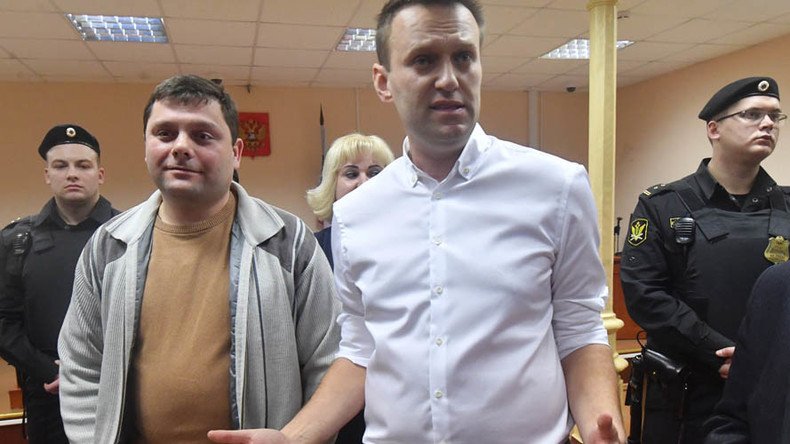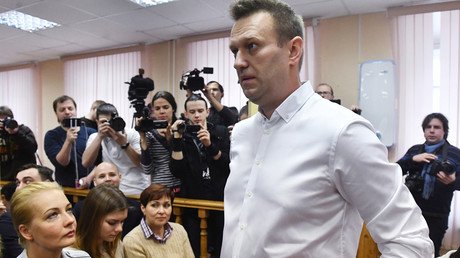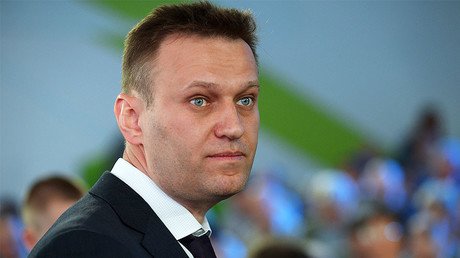Western media coverage of Navalny & Le Pen shows breathtaking hypocrisy

Press coverage of Russia's Alexei Navalny and some of Europe's opposition figures is startling in its myopia and double standards.
Just to avoid any misunderstandings, this is not a personal attack on Alexei Navalny. Instead, the focus here is the Western media, which seems to occupy a parallel universe when profiling him.
Following Wednesday’s court ruling in Kirov, we’ve seen signs American and British reporters in Moscow are not only apparently destitute of vision, but they may also be as blind as bats. The evidence is in the amaurotic and unseeing manner in which they cover the opposition activist’s travails.
Just to recap, Navalny was handed a five-year suspended prison sentence after being found guilty of embezzlement. This follows a legal process that commenced in 2013, which critics feel is politically motivated. The case involves a lumber company in the Kirov region called Kirovles.
Following the conviction, English language news outlets, ranging from The Moscow Times to USA Today, described him as part of the liberal movement in some form. Now, while it sounds like an enlightened pitch, the problem is that it’s total baloney.
URGENT: Russian court reads guilty verdict to opposition figure #Navalny – reports https://t.co/1Y0v7Tdgscpic.twitter.com/MxqAhnuoIG
— RT (@RT_com) 8 февраля 2017 г.
Yet, this misrepresentation isn’t really Navalny’s fault. After all, he’s been pretty clear regarding his feelings toward migrant workers from Central Asia and the Caucasus. He considers them vermin and has suggested they need to be exterminated.
"Cockroaches can be killed with a slipper, but as for humans, I recommend a pistol,” he once said.
The reality is that Navalny first came to prominence as one of the key supporters of the 2006 “Russian March,” where neo-nazi symbols were prominently displayed by participants. This was a controversial ’patriotic’ front which featured hardcore nationalist groups like Pamyat, the Movement Against Illegal Immigration and the National State Party of Russia.
The following year, Navalny co-founded 'People,' a new party which promised to fight for the rights of ethnic Russians. By 2008, it had merged with other groupings from the 2006 marches to become the 'Russian National Movement.' Navalny described the unified structures’ goals as "new political nationalism,” adding: "we can teach blatant liberals a thing or two.”.
Thus, we have the bizarre situation where a figure who makes Marine Le Pen look like Mary Poppins - and has expressed outright hostility to ‘progressives’ - is hailed as a modern Aleksandr Solzhenitsyn by Western correspondents in Moscow who need a compelling narrative for news desks back home. A hack pack of multiloquent mountebanks and runtish, dogmatic, bellicose and limited reporters of questionable journalistic proficiency. This from Max Seddon of cat-video site Buzzfeed being a case in point, as it amounts to something similar to interviewing Buzz Aldrin without mentioning the moon.
That is not to dismiss Navalny’s influence. Unlike Mikhail Khodorkovsky or Gary Kasparov, for instance, he has ambitions beyond playing to international galleries and blowing hot air. And whereas those two have practically no support domestically, Navalny has followers, albeit largely restricted to the capital and a drastically diminished total compared to a few years ago.
Furthermore, at a time when Russia’s so-called ‘systemic opposition,' led by the Communist Party and the (misnamed) Liberal Democratic Party appears to have bored voters into stupefaction, we've seen numerous reports suggesting the Kremlin has no objections to a Navalny Presidential run in 2018.
Indeed, such a move would be consistent with last year’s Duma elections when the political consultant Sergei Markov quipped: “Not only are the authorities not preventing the Khodorkovsky candidates from running, they even appear to be helping them.” Nevertheless, other commentators believe that the nationalist's legal tribulations will prevent his candidacy.
This is because, despite a severe recession, Vladimir Putin’s popularity is currently sky-high. Which can be ascribed to the West’s misguided sanctions policy, a desire for stability and lingering delight at Moscow’s re-absorption of Crimea in 2014.
As a result, it’s entirely feasible the Kremlin hopes for Navalny’s participation in the election, as it will probably energize Putin’s base to turn out in larger numbers than an entirely foregone conclusion would inspire.
For those of us who follow politics across Europe, coverage of Navalny often seems schizophrenic. Witness the treatment of Le Pen, Nigel Farage and Geert Wilders, all of who are flower-wielding moderates by comparison to the Russian activist. The creeping nausea wretches when you see Foreign Policy - generally no friend of racists - describing him as “Russia’s Last Opposition Hero.”
The same constricted vision is displayed inside the pages of The Atlantic, where Julia Ioffe - who dubbed the 2011 Bolotnaya protests as the ‘snow revolution’ - manages over 1,200 words without mentioning anything about Navalny’s hardline position on minorities. This is made more startling when you remember that the same writer spent all autumn complaining about Donald Trump supporters targeting her because of her own ethnicity.
The duplicity becomes more depressing, stark and grim when you contrast directly with coverage of French politics. The popular Western press has taken a uniform dislike to Le Pen - who is a peacenik compared to her Russian counterpart - and is generally hostile to Francois Fillon, too. The latter, more a traditional conservative than a patriotic firebrand, is also under investigation for questionable financial dealings in a process analogous to Navalny’s situation. However, articles on the likes of CNN are muted and neutral set side by side with their hysterical reports on the Kirov hearing.
Furthermore, when Le Pen was accused last week of “misspending” EU funds, the opening sentence in the Guardian’s take described her as “the leader of France’s far-right Front National.”
But their dispatch from Moscow on Navalny described him as “an opposition leader.” Which itself is inaccurate because he doesn't actually enjoy primacy in any political movement, be it systemic or otherwise.
The aggressive antipathy and enmity toward Le Pen is astounding when placed alongside the martyrdom of Navalny.
That said, the fact they've had to hitch their wagon to figure they'd militantly oppose in any Western state, serves to expose the bankruptcy of their ideas. And the complete intellectual collapse of Russia's westernization movement.
While these activists can be excused for scrabbling around in their punch-drunk state, especially after the humiliating rejection of their candidates in last year's Duma elections, particular scorn must be reserved for Western journalists who depict Navalny as something he’s not.
The statements, views and opinions expressed in this column are solely those of the author and do not necessarily represent those of RT.














